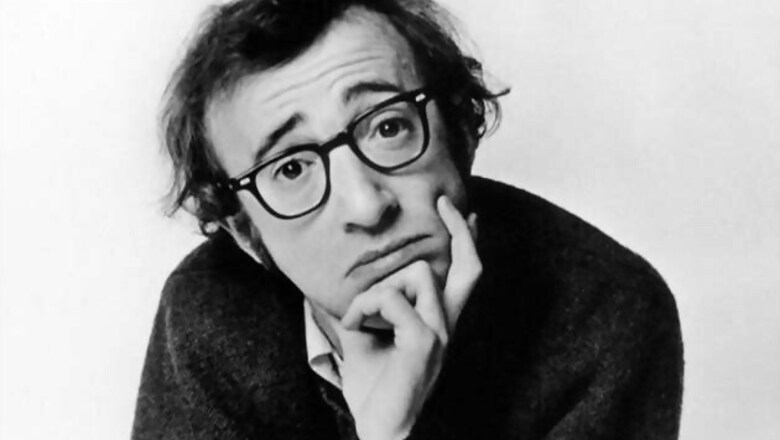
views
"What's your favorite Woody Allen movie? Before you answer, you should know: when I was seven years old, Woody Allen took me by the hand and led me into a dim, closet-like attic on the second floor of our house. He told me to lay on my stomach and play with my brother's electric train set. Then he sexually assaulted me."
Ever since the explosive open letter by Woody Allen's adopted daughter Dylan Farrow, accusing him of abusing her as a child, surfaced in The New York Times, opinion has been sharply divided among the tribe that worships the celebrated director.
Allen, who was recently honoured at the Golden Globes with the Cecil B DeMille lifetime achievement award, has called the accusations both 'untrue' and a 'disgrace' but the letter formed the basis of countless heated discussions on social media sites on a prickly subject that has raised the question - are we selective in our outrage directed at people we admire?
The connection that Allen fans have with the director's work is as primal as the allegations made by Farrow in the stunning letter crucifying Allen and the world of showbiz for standing up for an alleged pedophile. Many of the people defending him, some fiercely, have grown up with decades of the irreverent director's best works. Some of the reactions to the letter were downright indulgent. 'You cannot equate artistes by the same standards that you apply for a common man' was the popular sentiment.
Farrow said that her adoptive father had molested her as a child in 1992. In a letter to op-ed columnist Nicholas Kristof, she said "she was moved to speak out because of Hollywood's continued embrace of Allen." Allen was investigated on child molestation claims for the alleged 1992 incident in Connecticut, but prosecutors elected not to charge him.
Farrow said Allen would have her get in bed with him, and at other times "place his head in my naked lap and breathe in and breathe out." "For as long as I could remember, my father had been doing things to me that I didn't like," said Farrow. "These things happened so often, so routinely, so skilfully hidden from a mother that would have protected me had she known, that I thought it was normal."
Farrow's letter was as naked a letter could be, holding nothing back, and deploring a culture that made heroes of sexual abusers. One would think that the internet would implode in unanimous scorn for a man who spent years brushing off and denying accusations linking him to pedophilia. But not so.
Men and women who love Allen, including many stars and acquaintances, reacted cautiously. Some were openly sceptic about the circumstances leading up to the revival of an old allegation for which Allen did not stand trial.
For many of us, art is purer than the artiste and the line dividing the two fades when confronted with stupendous allegation weighed against immense talent. Ironically, Allen has entertained a generation of fans playing neurotic characters in dysfunctional families.
While anyone is free to express an opinion on the grisly subject, the fact remains that a when a victim (imagined or real) takes the big leap to go public on an incident which she said has ruined her life growing up and has nothing to gain from personally, we temper our reactions to the people we admire.
"I would just kindly ask you to interrogate the part of you that reflexively casts doubt when a survivor tells their story," wrote Heben Nigatu (@heavenrants) on Twitter.
Forget Farrow if you will. It's important to keep in mind that the scepticism is a big part of the reason victims of pedophilia rarely find the courage to come out in public with their stories. We keep telling them that their voices do not matter when they are raised against those in influential positions.
Should Allen be given a chance to tell his side of the story? Of course he should. That's why there's a legal system in place. But till that happens it's criminal to cast doubt on the allegations of Farrow. The same bias worked in favour of director Roman Polanski.
Now take the case of disgraced journalist Tarun Tejpal, currently in jail, awaiting trial. The editor-in-chief of one of India's leading investigative magazines was incarcerated after a female colleague accused him of sexually assaulting her.
Part of the onslaught of the criticism and online hatred directed against Tejpal was his leaked letters in which he referred to the alleged incident as "a bad lapse of judgement" and "an awful reading of the situation". He called the alleged abuse itself an "unfortunate incident".
The people who condemned him held nothing back in asking that he be brought to book. The few voices in his favour were drowned in an avalanche of shocked outrage. Tejpal will have his day in court. But his status as an influential editor did nothing to grant him security from mainstream opinion. Tejpal isn't a bigger star than Allen, not perhaps internationally as feted as he is.
But a piece that picks holes in a victim's story is the first step to failing her.
True, there are both sides to a story. Here's an analysis in support of Allen. And here's its counter. Let's analyse everything before we react but let not our admiration for a man whose intangible invincibility cloud our judgment. (with some inputs from AP and Reuters)


















Comments
0 comment